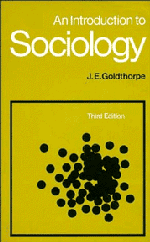Book contents
4 - Kinship, marriage and the family
Published online by Cambridge University Press: 05 July 2011
Summary
In this and the remaining chapters, we turn from what sociology is and what sociologists do to consider in general terms what they can tell us about the major institutions, or institutional clusters, in human societies. We consider these under the five heads of institutions concerned respectively with: kinship, marriage and the family; getting a living; inequality and social class; social control; and ritual. The needs that they meet are universal, grounded deep in our biological and psychological nature, yet the ways in which our basic needs are met differ widely in different societies. (It will be apparent from this way of putting it that our standpoint is broadly a functionalist one, though not one unaware either of conflict or of change.)
In every society there are institutions that take account of the difference between men and women, by regulating the terms upon which they mate and reproduce, the choice of a marriage partner and the division of labour between them. Broadly, we call these institutions marriage. A related set of institutions exists to deal with the biological fact that, in the human species, the young are extremely dependent and go on being so for a long time. The period of immaturity in humans, about a quarter of a normal lifetime, is far longer than in most other animal species. At the other end of life, too, ageing humans need care and help.
- Type
- Chapter
- Information
- An Introduction to Sociology , pp. 73 - 110Publisher: Cambridge University PressPrint publication year: 1985



